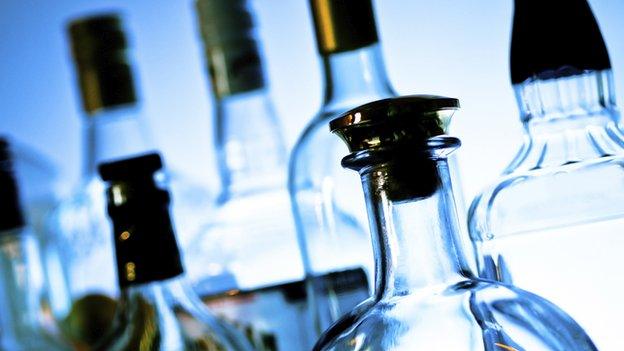Are we now on half measures?
- Published

One thing's clear from the latest analysis of drinking habits - fewer people are indulging in alcohol and that's largely down to the preferences of young adults.
Beyond the headline the ONS also reveals a fascinating snapshot of changing behaviour which tell us something about British society.
While the proportion of all adults surveyed who say they are teetotal increased from 19% to 21% between 2005 and 2013, the percentage of 16-24 year olds not touching alcohol rose sharply from 19% to 27%.
Amongst those who are 65 and over the opposite happened, with non drinkers falling from 29% to 27% of the total.
The fall in the number of teetotal pensioners was entirely down to fewer women saying they abstain from alcohol.
Binge drinking, defined as at least one heavy night in the week before the survey was conducted, fell overall between 2005 and 2013 but this was entirely down to the behaviour of young adults.
Amongst 16 to 24 year olds it dropped from 29% to 18% of those surveyed and for the 25 to 44 year olds it fell from 25% to 19%.
For the older age groups there was little change.
There was a stark difference in numbers who don't drink around the nations and regions of the UK. While 15% of adults in the South West of England are teetotal, more than double that, 32% of non-drinkers, in London don't touch alcohol.
Adults in the north east of England and Scotland are most likely to have binged in the previous week (36%).
Tighter rules
So what's happening and why are younger people apparently turning away from drink?
The ONS believes that the targeting of underage drinking in recent years has achieved results.
A tightening of the rules at licensed premises making it harder for young drinkers to purchase alcohol and other initiatives aimed at reducing the availability of drink have played a part according to statisticians.
Cultural and religious factors may well provide an explanation for the increase in abstinence.
The Alcohol Health Alliance said the fall in consumption may in part be due to "the change in the ethnic make-up of the country".
The Alliance says the figures were "encouraging" but should provide no cause for complacency about the problems associated with alcohol.
Perhaps people are simply becoming more responsible and have taken on board the health messages about the dangers of excess drinking.
The Portman Group, which represents the drinks industry argues there has been a culture change over the last decade and an "improving relationship with alcohol".
Medical experts urge caution about the figures claiming that people responding to questions in surveys can under-state their drinking habits.
The survey doesn't tell us about other behaviour which might influence health and which might have increased as the popularity of drinking wanes.
Yet at a time when Westminster and the devolved administrations have made a priority of reducing alcohol-related harm, these survey results provide some grounds for cautious optimism.
- Published13 February 2015